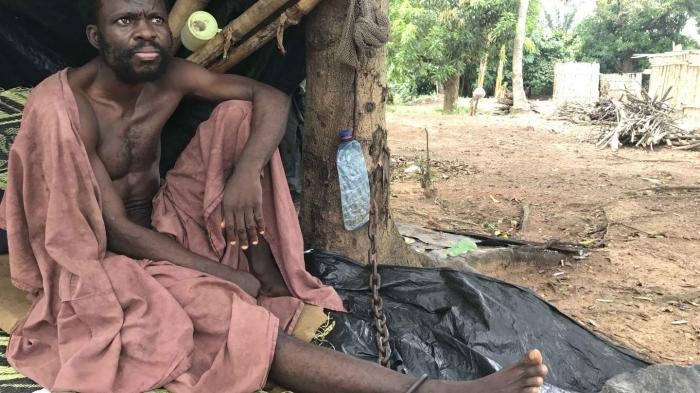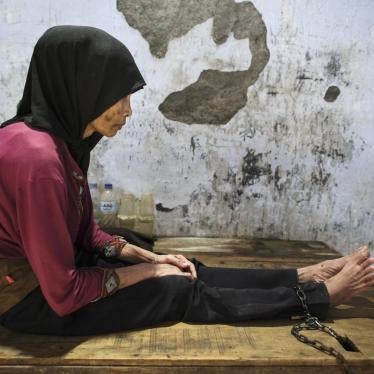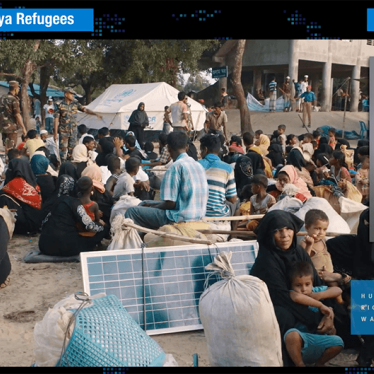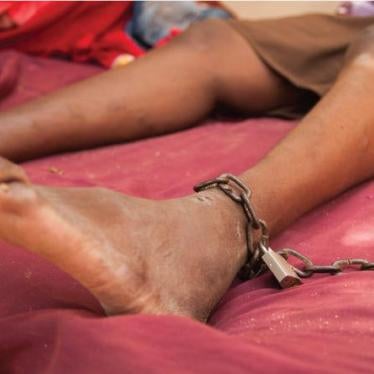(London) – Hundreds of people with real or perceived mental health conditions remain chained or confined in prayer camps in Ghana, despite some progress, one year after the government pledged to enforce a ban on shackling, Human Rights Watch said today on World Mental Health Day.
The government of Ghana should take immediate steps to end shackling establishing a monitoring system to ensure enforcement of the ban, and further developing community mental health services. As part of the Inaugural Global Summit on Mental Health, hosted by the United Kingdom on October 9-10, 2018, Ghana should reaffirm its commitment to a rights-based approach to mental health and meaningful consultation with people with psychosocial disabilities (mental health conditions).
“Hundreds of people with psychosocial disabilities are still shackled like cattle,” said Shantha Rau Barriga, disability rights director at Human Rights Watch. “It’s not only important for the chains to come off, the government needs to sensitize communities and invest in local mental health services. If not, people with psychosocial disabilities may again be subjected to the cruel and abhorrent practice of shackling and the government’s ban will be an empty threat.”
The head of Ghana’s Mental Health Authority, Dr. Akwasi Osei, announced on World Mental Health Day in 2017 that the government would enforce the 2012 Mental Health Act provision that people with psychosocial disabilities “shall not be subjected to torture, cruelty, forced labour and any other inhuman treatment,” including shackling. He said it was “illegal to put anyone in chains.”
However, on a recent visit to Mount Horeb Prayer Camp in Mamfi, jointly with the Mental Health Authority, Human Rights Watch found dozens of people with psychosocial disabilities still chained and detained in overcrowded and congested conditions.
During that visit, Human Rights Watch found more than 140 people with real or perceived mental health conditions detained in unsanitary and dark rooms, with little ventilation or opportunities to go outside. The stench of urine was overwhelming. One room housed 60 men, some of whom have been there for more than five years. As of October 10, 42 men remain confined in that room. The gate locked. 113 people with real or perceived mental health conditions are now in the camp.
A 63-year-old man who has been there since 2012 said, “When I go outside, I feel good. But we don’t get to go outside.”
Families bring people with real or perceived mental health conditions to prayer camps such as this one because of widely-held beliefs that such disabilities are caused by a curse or evil spirits.
Osei expressed his concerns about the ongoing chaining and congestion at Mount Horeb: “You and I can be in their shoes. And the question is, if I am in their shoes… would I be happy to be treated that way? The answer is ‘no.’” He went on to say that, “People [with] mental health conditions are human beings like us, and we should completely respect their human rights.” Under pressure from the Mental Health Authority, the camp leadership has pledged to eliminate the practice of chaining.
In June 2017, in an effort to enforce the law, the Mental Health Authority freed 16 people, including two girls, at Nyankumasi Prayer Camp in central Ghana. Those freed, some of whom have mental health conditions, were taken to nearby Ankaful Psychiatric Hospital. Since then the camp has remained chain-free.
On a visit to the camp in September, Human Rights Watch spoke with Felix, an educated 46-year-old man who was among those freed in the camp. He was chained to a tree for five years, and continues to live there, free of chains, in a room of his own. He said, “When I was under the tree, it [was] very difficult there, very much difficult, and... we couldn’t do anything about it.” When asked what it felt like when the chains were removed, he simply said, “We were very much happy.”
Serious gaps remain in ending the practice of shackling across the country, in part because the monitoring system established by the 2012 Mental Health Act has yet to be set up. It has been stalled by the lack of political will at the highest levels, government officials and partners from nongovernmental groups told Human Rights Watch. The former United Nations expert on torture, Juan Mendez, urged the establishment of, and adequate funding for, such an oversight system following his 2013 and 2015 visits to Ghana.
There are no clear figures on how many prayer camps exist in Ghana, the number that chain people with psychosocial disabilities, or the number of people in chains. Without a monitoring system, the camps operate with virtually no government oversight.
The government of Ghana should immediately set up the monitoring system, described in the law as Visiting Committees, Human Rights Watch said. The government should provide adequate resources to conduct investigations to ensure that people with psychosocial disabilities are not subjected to inhuman or degrading treatment or other abuses.
In parallel, the government should develop community-based mental health services based on the human rights principles of informed consent, dignity, and freedom from torture that enable people with psychosocial disabilities to live in the community. The government should also create public awareness campaigns to change the discriminatory attitudes toward people with psychosocial disabilities.
“There is too much stigma and misunderstanding around mental health, leading to abuses against people with psychosocial disabilities, and no government body is watching,” Barriga said. “Oversight is more important than ever to make sure that people who have been freed from chains have their rights and dignity restored.”









